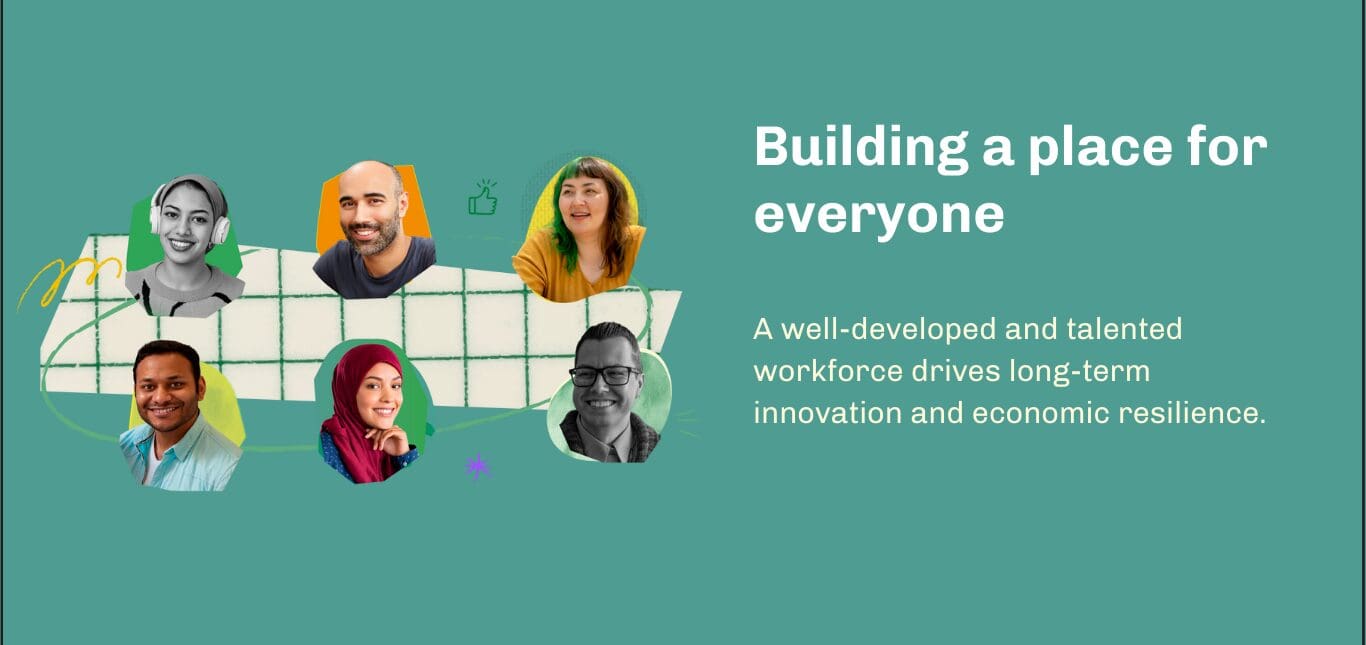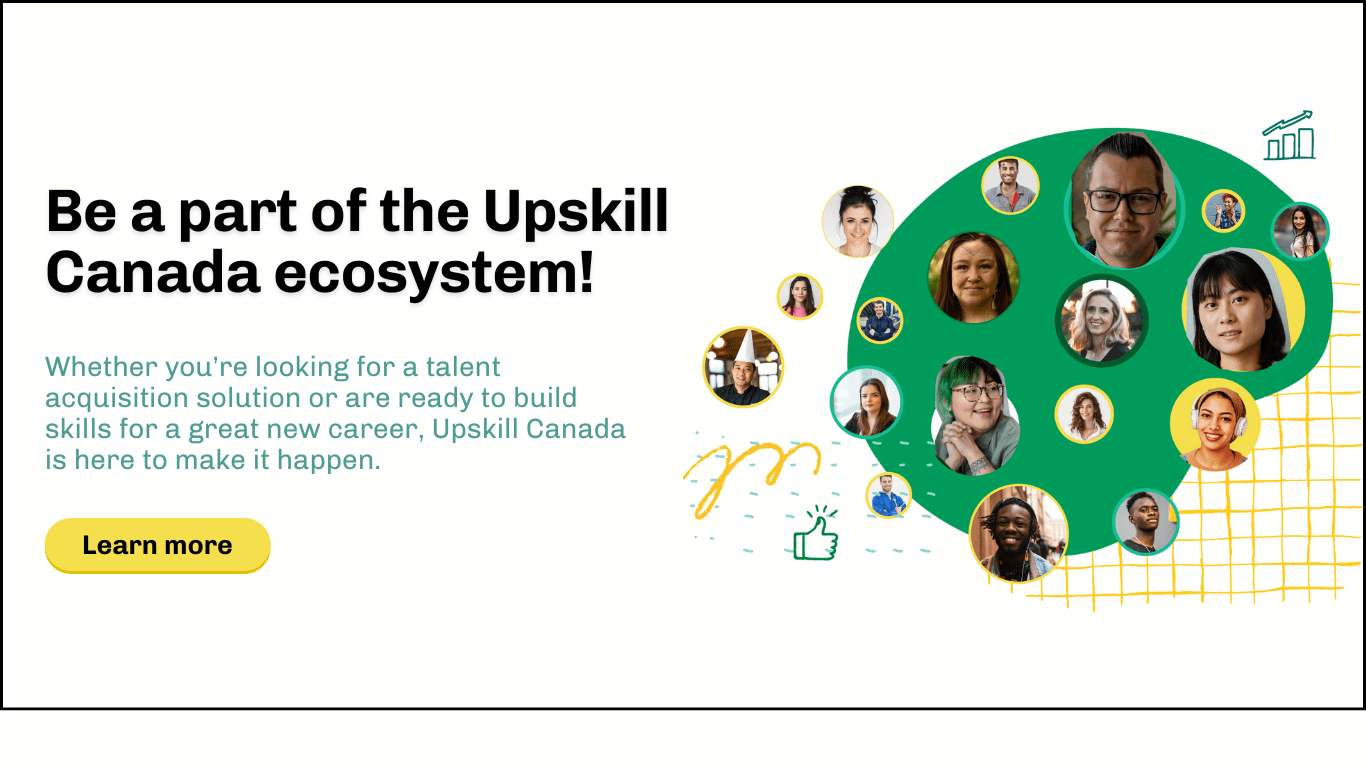What are the greatest challenges that lie ahead for Canada this century?
Depending on who you ask, you’ll get many different answers—but no matter where they live and who they are, most Canadians are concerned about many of the same things, including the challenges of affordability, environmental sustainability, and economic growth, and how workforce development can play a key role in addressing them. For example, poll after poll has shown that Canadians are deeply concerned about the environment and the effects of global warming. At the same time, people across the country are worried about issues of affordability and the direction of the country’s economy.
These issues are deeply connected. Step back and you might wonder if it’s possible to grow an economy while protecting the planet. But more and more, policymakers think that Canada and the world can—and must—achieve net zero emissions in the coming decades, and that meeting this goal requires building a more sustainable and socially inclusive economy. As it turns out, workforce development just might be one of the most important tools we have to meet both our climate and sustainability goals.
Building the inclusive economy
Before we get to the connection between workforce development and inclusive economic growth, let’s ask ourselves why an inclusive economy is important. The fact is, a more inclusive economy is a more successful and productive economy. When companies and governments work to build an economy that provides opportunities for everyone, the economy is by definition larger than it used to be.
At the same time, businesses and economies that are inclusive are better placed than others to reap the so-called diversity dividend, which includes things like better decision-making, higher profits, and increased productivity. And according to Tiff Macklem, Governor of the Bank of Canada, shared prosperity means more prosperity for everyone. As Macklem makes clear, it’s a virtuous circle.

Canada’s productivity problem
Unfortunately, drawing that circle is harder than it seems. Despite the fact that Canada is one of the world’s leading economies, the country has a longstanding productivity problem. In fact, according to the Bank of Canada, Canadian productivity has declined dramatically since the 1980s relative to the United States and most of our G7 peers. Given this drop in productivity and growth, it’s no surprise to learn that over the same period, income and wealth inequality have emerged as serious and persistent challenges.
Economists and policy-makers disagree about the causes of Canada’s weak productivity and growing inequality, and they have different prescriptions for treatment. But there is some agreement about the key factors that contribute to increased productivity, and one of the most critical of these is a skilled workforce. Without the right skills and aptitudes, labour productivity cannot achieve its potential, and our economy suffers.
Skills for productivity
Experts have been telling us for some time now that the future of work is already here. In light of recent technological advancements this prediction seems accurate. And with one of the best-educated workforces in the world, Canadians should be well-placed to take full advantage of new technologies and the gains they promise. Unfortunately, the evidence shows that despite a strong rise in the number of Canadian workers with a post-secondary degree, a corresponding rise in labour productivity has failed to materialize.
As we’ve said before, traditional education pipelines—while incredibly valuable—aren’t enough to equip Canadians with the skills they need to thrive in the new economy. Old ways of sourcing and hiring talent aren’t working either, as the country’s ongoing skills shortage clearly indicates. The solution is to help organizations and people build skills for the future right now—and that’s where targeted, industry-led upskilling comes in.
Building a place for everyone
An emphasis on upskilling and lifelong learning is key to a flourishing workforce in the knowledge economy. But it’s more than that. A well-developed and talented workforce does more than fill immediate labour market needs—it drives long-term innovation and economic resilience. As everything we do becomes more knowledge-based and technologically advanced, we need people who are adaptable, creative, and skilled in using and adopting new technologies. At the same time, upskilling can help Canada leverage its innovation and productivity potential by reducing the barriers that people from equity-deserving groups face when it comes to employment.
Sustainable and clean technology
There is no better example of this skills gap than in the clean technology revolution. Canada is committed to creating a net-zero economy by 2050. There is a comprehensive strategy in place to meet this goal that includes major investments in clean technology. But finding skilled workers ready to contribute to Canada’s cleantech revolution is a significant challenge. A recent survey warns that finding and retaining talent was the third most-cited challenge by employers in the sector, with companies also identifying a lack of skills required for critical jobs. Bringing more workers into the cleantech revolution through upskilling is key to helping build both environmental and social sustainability.
 Find out more about upskilling
Find out more about upskilling
Canada cannot be complacent when it comes to skills training. Innovative workforce development is a powerful tool for fostering inclusive economic growth and meeting our sustainability goals. By addressing skills gaps, empowering underrepresented groups, and promoting innovation, upskilling programs help ensure that all Canadians can participate meaningfully in an economy that is both green and fair.
Learn more about the upskilling programs offered across the country from Palette Skills, Upskill Canada, and our many partners.







